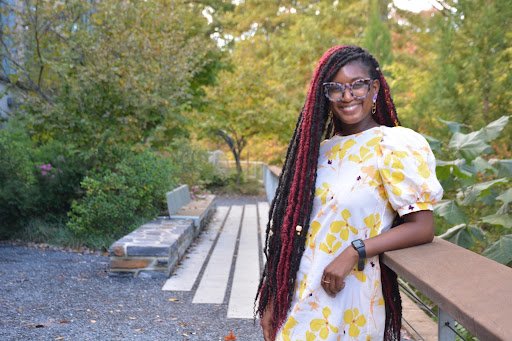How Religion Connects To Personal Culture and Other Faucets of Life
Interview with QuiAnne’ Holmes by Bri Ryerson, Wellness Operations Intern
QuiAnne’ Holmes, M.Ed., is a Black woman who strives to provide participants opportunities to learn about the interconnectivity of wellness in their lives through educational workshops, delivering experiential programs within broad areas of community engagement, leadership development, cultural competency, social action, and marketing; focused on practicing self-compassion, agency, and liberation. She has committed herself to cultivating and shaping sustainable holistic wellness programming and support to designated communities and environments. She is a skilled facilitator, bringing a dedication to supporting personal growth and development within the context of institutional and community missions. You can connect with her through her website lets-heal-together.org or via LinkedIn.
Personal culture is the concept of experiencing different cultures that you have emerged in at any point in time. QuiAnne’ believes that religion and personal culture can be interconnected because “humans engaging in religion can embody the attitudes, behaviors, and beliefs associated with its practice/system/tradition(s).” It is by cultivating habits and behaviors based on these beliefs and values, you are building and expanding your personal culture. Such habits and behaviors can include but are not limited to prayers, rituals, festivals, public service, and meditation. However, if you do not practice or subscribe to a religion, QuiAnne’ suggests that “your beliefs and actions can be connected to other worldly things that could or could not be influenced by spirituality.” Nevertheless, religion is only one piece of culture. Even if one is religious, they can still be influenced by worldly things.
Strengths in Religion
QuiAnne’ believes that religion can serve as a supportive and challenging influence on mental health. The “ability to understand who you are and how you take care of yourself is an important part of your mental health; attitudes, beliefs, traditions, and practices from a religion can shape how you value and manifest self care in your own life.” So how does religion support mental health? “Religion could be very helpful with prayers or daily practices” QuiAnne’ states, as these habits create routine and can also elevate feelings of hope and purposefulness.
With this in mind, how do you navigate negative things that happen in spiritual practices? It is important to “navigate by acknowledging the strengths and challenges of your experience rather than saying there are ‘positives’ and 'negatives’” because sometimes there are challenging aspects of religion. For those who do not take part in religion, your life experience will mostly change with how you navigate life challenges and the resources you lean on in times of needed support. Overall, it is important to recognize the mental health component of subscribing to a religion and the strengths and challenges that you will experience.
Challenges in Religion
Can religion create prejudice against discriminated groups? “Absolutely,” QuiAnne’ says, “inevitably, a religion (there are several) has the ability to promote or enable prejudice when it is not inclusive to all identities.” In some cases, this creates spaces that are harmful for members of historically excluded people. If someone approaches a religion who is in multiple disenfranchised groups, it can create a negative reaction and overall show how inclusive or exclusive a religious group really is.
Photo retrieved from Pixabay
Religion and prejudice also tie into mental health. Religion can negatively impact mental health if prejudice is involved. QuiAnne’ explains that “feeling and/or experiencing exclusion from a social group can create a shift in attitude, demeanor, and behavior, all of which are connected to mental health.” While there are a lot of different pieces that connect together to create religion, it can further disenfranchise groups of people.
How to Help Navigate Challenges in Religion as a Professional
QuiAnne’ likes to “focus on mindfulness and meditation” which allows her to focus on the present moment. She explains that it is very important to give ongoing coaching to help lead clients to the next best step in their life. It is also important to encourage therapy and talking to professionals that have specialty in this area as they are able to help others navigate how to channel emotions and process trauma.
How can professionals help a client who has had a negative experience with religion? “With my services, I focus on mindfulness and meditation,” QuiAnne’ says. “Identify what they want and what’s coming to the surface… [also] give them grace and help them understand that they need to continue to give themselves grace and self compassion”. In addition, she encourages other professionals to be holistic in their approach while helping clients. Focus on “building a ‘toolkit’ of many different things to help us and picking one each day so that we don’t rely on one specific thing”. Using breathing techniques and semantics as well as acknowledging growth/challenges can help professionals be more holistic and focus on many different aspects at once.
While religion can have strengths and challenges, it is important to have an open mindset and continue to give yourself and others grace as well as compassion. As QuiAnne’ mentioned earlier, professionals should be holistic in their approach to helping someone navigate the challenges of religion and any hardships they have faced. It is also vital to understand how disenfranchised groups can be affected by religion and how personal culture as well as mental health ties into the discussion of religion and how we are impacted by religious practices.
****
Project Passport is a proactive mental wellness company that aims to bring mental wellness retreats, workshops and other services to company teams. We also help individuals create joy in their lives every step of the way. To learn more about our company retreats and services, click here. Our travel retreats will resume in the future as the world reopens.


